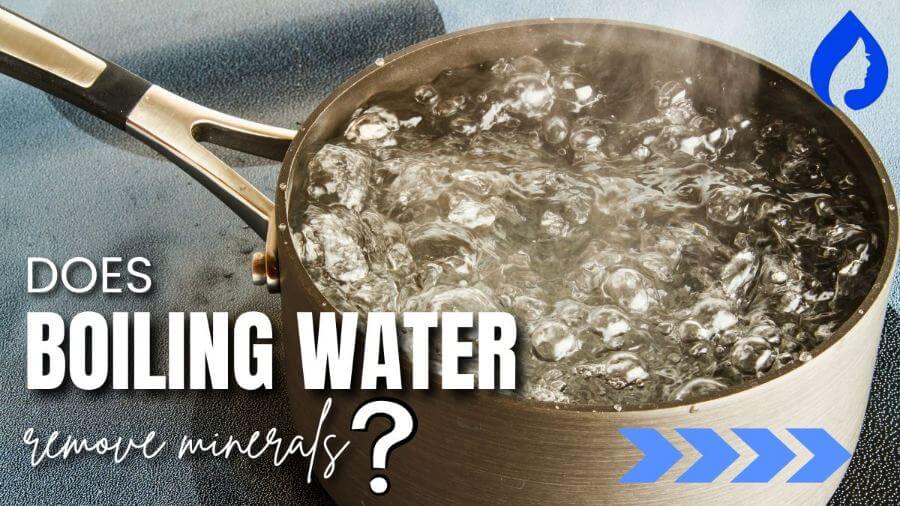
Boiling water does not remove minerals. Minerals in water have much higher boiling points than water, so you see white sediments in the vessel after the water is fully vaporized.
It makes boiling an excellent way to remove bacteria without losing minerals.
But is boiling really the best way to purify water? Continue reading to find out more!
🤔 What Gets Removed By Boiling Water?
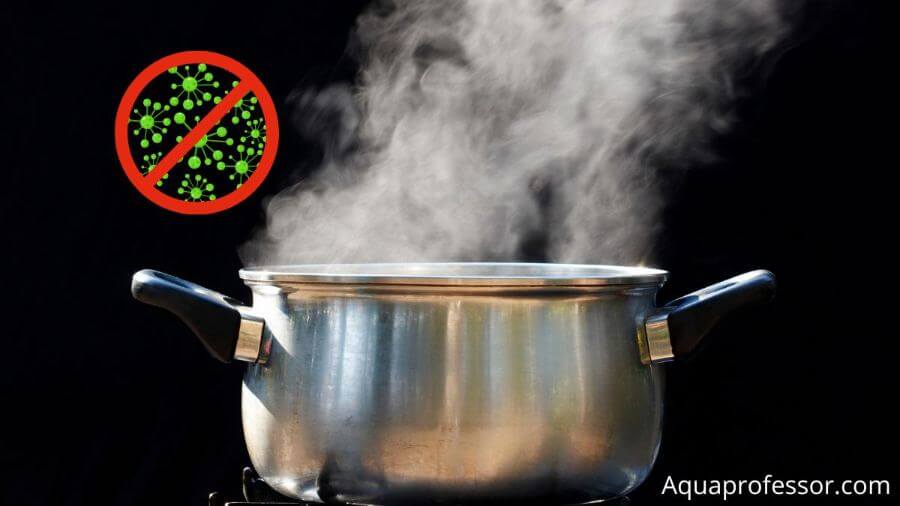
Boiling eliminates, harmful bacteria, and other disease-causing pathogens from your drinking water.
Most microbes can’t tolerate 65 degrees Celsius heat for more than 20 minutes, so they ultimately die.
You can also remove chlorine from tap water by boiling it for at least 15 minutes.
However, water-hardening minerals like calcium (Ca2+) and magnesium (Mg2+) have much higher boiling points than water (for example, 1484 degrees Celsius for calcium). So, they remain in the vessel even after the water is boiled and doesn’t get removed.
Also, if your tap water comprises excess fluoride or lead, boiling can’t remove it. In fact, boiling enhances their concentration in your drinking water.
🔴 What Are The Disadvantages Of Boiling Water For Purification?
Boiling to purify water comes with the following disadvantages:
⚠️ It Doesn’t Remove Heavy Metals And Contaminants
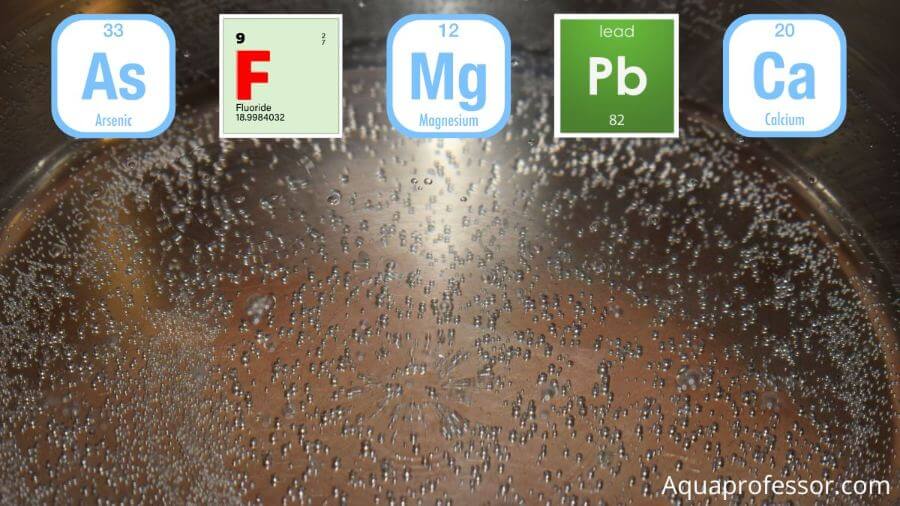
Boiling water eliminates bacteria and most disease-causing pathogens significantly from your tap water.
However, it can’t remove impurities, chemical contaminants, and heavy metals with a boiling point of over 100 degrees, such as:
🤮 Gives Flat Taste
When you boil tap water, the dissolved oxygen or air leaves, resulting in an unwanted flat taste.
Aerating the boiled water helps you to get rid of the flat taste of the water. To do it, pour the boiled water back and forth in two containers.
Repeat it a few times. Your boiled water will no longer taste flat.
Note:
In general, municipal water supplies ensure water disinfection. So, there’s no need to boil your tap water unnecessarily unless the government issues a boil water advisory due to any bacterial outbreak.
💧 Boiled Water Vs Filtered Water
| Basis | Boiled Water | Filtered Water |
| Meaning | Water is heated in a vessel to kill bacteria | Water is passed through different filter membranes to remove harmful substances and contaminants from it |
| How it’s done | Heating the water to 60 degrees for at most 20 minutes | Installing a water filter at home and passing the tap water through it |
| Types | 1. Free convection boiling, nucleate boiling 2. Critical heat flux, Transition boiling 3. Film boiling | 1. Reverse osmosis 2. Distillation 3. UV disinfection 4. Sediment filtration methods 5. Activated Carbon Ion exchange |
| Advantages | Kills bacteria and removes chlorine and volatile compounds at a low cost | More effective in removing heavy metals and dangerous contaminants present in your drinking water |
| Disadvantages | Bad smell and unpleasant taste of drinking water; can’t remove all harmful substances or contaminants | Consumes electricity, expensive to install and maintain, water wastage |
🥛 What Is Boiling Water?
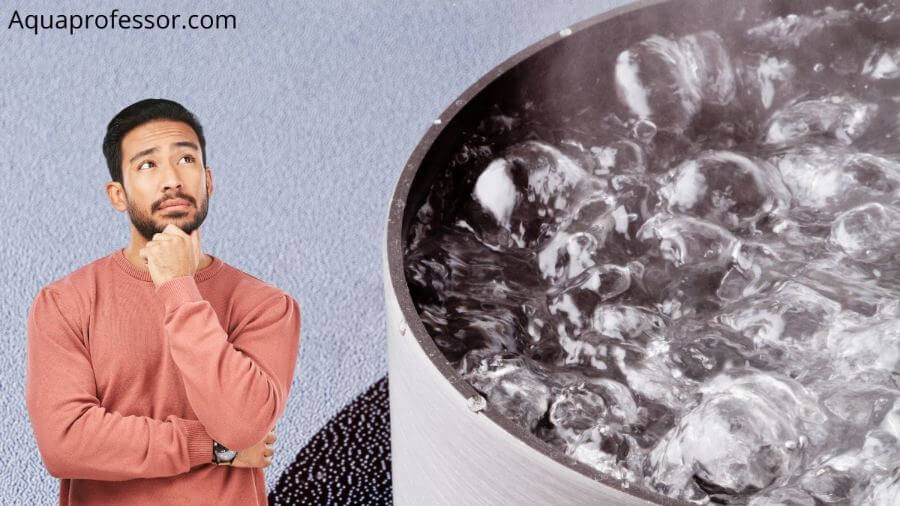
When water is heated to kill or remove impurities and disease-causing organisms, it’s called boiled water.
Boiled water is generally considered safe for drinking as it’s one of the best ways of killing germs in tap water.
🔲 What Is Filtered Water?
Filtered water is the water we get after purifying or filtering water with the help of a water filtration system. They pass the drinking water via an impurity-trapping filter media so that only the clean water comes out.
🧐 How Are Boiling And Filtration Done?
Boiling is an easy do-it-yourself method that enhances the water quality by killing most bacteria and viruses to make drinking water safe. Here’s how:
To filter your tap water and enhance its water quality, install a water filter at your home and connect it to the tap water flow. It makes the tap water automatically pass through the water filter once the machine is put on, and the water becomes fit when you want to drink it.
📜 Stages Of Boiling Water
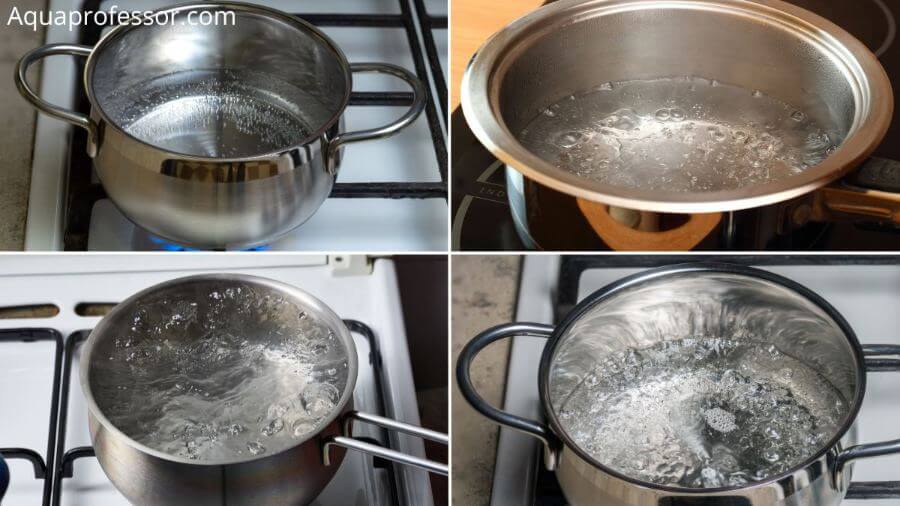
The four stages of boiling water are:
📜 Stages Of Filtered Water
Filtered water usually undergoes 5 stages, and they’re:
Also Read: When To Replace Water Filter Cartridge
⚖️Pros And Cons Of Boiling Water
Pros
- A quick way to kill bacteria in water effectively
- Affordable
Cons
- Doesn’t remove heavy metals like lead or hard minerals
- Makes water taste bland
- Inconvenient for regular use
⚖️Pros And Cons Of Filtered Water
Pros
- Fast and effective in removing various contaminants
- Convenient for regular use
- Improves the drinking water’s taste
Cons
- Expensive to install and maintain
- Popular filter types cost electricity
- The filters of reverse osmosis systems cause water wastage
👉 Key Takeaway:
Boiling is a temporary water purification method to kill bacteria and remove free chlorine effectively, but it can’t replace water filters.
💡Does Boiling Water Remove Minerals: FAQs
🥛 Does boiling water remove hardness?
No, boiling tap water, though capable of removing the water’s temporary hardness, fails to remove the permanent hardness of the water.
When the water is boiled, a precipitation reaction occurs, which results in the separation of the hard water minerals like calcium and magnesium carbonate from the pure water, thus decreasing the hardness of the water to some extent.
However, once the boiling process is over and the water is returned to its normal temperature by cooling it under the fan, it no longer remains soft.
This is because the hard minerals bind with the pure water, making drinking water hard again. Only water softeners are capable of making hard water soft permanently.
🙄 Is boiling water enough to purify it?
No, boiling tap water is not enough to purify the water.
This is because the boiling process only disinfects water by killing the harmful bacteria and disease-causing pathogens in your drinking water.
It doesn’t remove chemicals and the heavy metals. You need to install an RO water filter at your home to remove these unwanted elements from your water.
⏩ Does boiling water remove chlorine?
Yes, boiling water can eliminate chlorine from your tap water if it’s done for at least 15 minutes.
As a substitute for it, you can also keep the chlorinated water uncovered within a jug in your room for twenty-four hours or more.
It will make the chlorine evaporate into the atmosphere without even boiling.
⏩ Does boiling water remove fluoride?
No, boiling tap water instead of removing fluoride increases the percentage of fluoride in your water.
Though boiling water removes chemicals and various impurities other than eliminating chlorine and pathogens from your drinking water, it’s never a process for fluoride removal.
Better use fluoride water filters instead.
🤔 What does boiling water not remove?
Boiling water doesn’t eliminate the following:
1. Pesticides and nitrates of fertilizers
2. Arsenic, lead, or other toxic metals
3. Uranium, radionuclides, and other radioactive metals
4. Chemicals
5. A few SVOCs
6. Microplastics
7. Hard minerals
8. Byproducts of various disinfectants
9. Pharmaceuticals, etc.
Adarsh is a Health & Nutrition Sciences graduate with expertise in environmental health. He is associated with ventures like Glacier Fresh Filter and Simpure Filter Systems. Through Aqua Professor, he intends to provide helpful information to every home to help them make smarter decisions.
